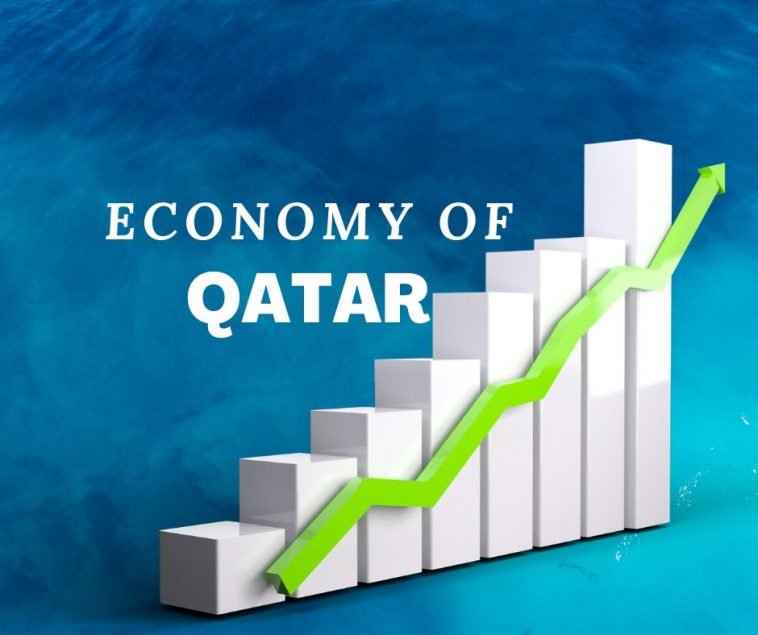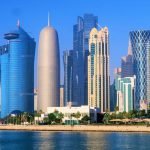Qatar is one of the wealthiest nations in the world in terms of GDP per capita. It’s economy is exceptionally reliant on oil and flammable gas extraction which represents more than 50% of GDP, 85% of fare income, and 70% of government income. Since demonstrated oil and gas saves are evaluated to continue current creation levels just for the medium run, the government has been putting forth new activities and attempts to differentiate the economy into a sustainable long-term income.
In this article, we have aggregated few information that you have to know about the Economy of Qatar.
Qatar Economy- How It Evolved?
Qatar’s economy has evolved rapidly over the past few decades, transforming the country from a small fishing and pearling community to one of the world’s richest nations. The economy of Qatar is primarily based on the country’s vast oil and natural gas reserves, which have been a major driver of economic growth since their discovery in the mid-20th century.
In the early years of its development, Qatar relied heavily on revenue from fishing and pearl diving, which were its main sources of income. However, with the discovery of oil and gas reserves in the mid-20th century, the country’s economy experienced a significant transformation. Qatar’s oil and gas reserves are some of the largest in the world, and have played a key role in driving economic growth and development.
In the 1970s and 1980s, Qatar invested heavily in the development of its oil and gas infrastructure, building pipelines, export facilities, and other infrastructure to support the production and export of oil and gas. This investment helped to create jobs, boost incomes, and drive economic growth, and laid the foundation for further economic diversification in the years to come.
In the 1990s and early 2000s, Qatar began to diversify its economy by investing in a range of sectors, including finance, tourism, and real estate. The government launched a number of initiatives to encourage foreign investment, and attracted a range of international companies to set up operations in the country.
Today, Qatar’s economy is one of the fastest-growing in the world, and has one of the highest GDP per capita in the world. The country’s economy is heavily reliant on the oil and gas sector, which accounts for around 60% of GDP and 85% of export earnings. However, Qatar has also made significant investments in a range of other sectors, including finance, real estate, and tourism, which are helping to drive economic growth and diversification. The government has launched a number of initiatives aimed at further diversifying the economy, including plans to develop the country’s transportation, telecommunications, and renewable energy sectors.
Along with this, the Qatar government currently centers around controlled economic development that suits the size of the nation.
Parts of Qatar’s Economy
Financial Assets
The Qatar Investment Authority (QIA) is one of the country’s key financial institutions and manages its vast financial assets. The QIA is responsible for investing the country’s excess oil and gas revenue in a range of assets, including real estate, stocks, bonds, and other financial instruments.
The Qatar Central Bank is also a key financial institution in the country, responsible for regulating the country’s banking sector and managing its monetary policy. The bank has played a crucial role in ensuring the stability of the country’s financial system and promoting economic growth.
Over the years, Qatar has also worked to diversify its economy by investing in other industries, such as tourism, education, and healthcare. The country has established several free zones and special economic zones to attract foreign investors and create new business opportunities.
Qatar’s economy has experienced significant growth over the past few decades, and its financial assets have played a key role in driving this growth. The country’s strong financial sector, along with its efforts to diversify its economy, have helped it to become one of the wealthiest nations in the world.
Open Markets
Qatar has a relatively open economy with a low tax regime and a business-friendly environment. The government has been implementing reforms to diversify its economy and attract foreign investment, including allowing full foreign ownership of companies in most sectors, reducing bureaucracy, and investing in infrastructure.
Qatar is a member of the World Trade Organization (WTO) and has several free trade agreements with other countries, including the United States, China, Japan, and Singapore. The country has a well-developed financial sector with a range of financial institutions, including banks, investment firms, and insurance companies.
The Qatar Stock Exchange (QSE) is the primary stock market in the country, with a market capitalization of around $180 billion as of 2023. The QSE is home to several blue-chip companies, including Qatar National Bank, Qatar Islamic Bank, and Industries Qatar. The QSE is also a member of the Arab Federation of Exchanges and the Federation of Euro-Asian Stock Exchanges.
In addition to the QSE, Qatar has established several free zones to attract foreign investment and promote trade. The Qatar Financial Centre (QFC) is one such zone, which aims to become a regional financial hub by providing a tax-free environment for businesses and a range of financial services.
Agriculture
Due to the country’s arid climate and limited water resources, agriculture in Qatar is challenging. However, the government has made efforts to support and develop the sector by investing in modern technologies, such as hydroponics and desalination, and implementing policies to encourage private sector investment.
Qatar’s agricultural sector primarily focuses on the production of fruits and vegetables, including tomatoes, cucumbers, eggplants, and melons. The country also has a small livestock sector, producing meat, dairy, and poultry products.
Despite these efforts, Qatar remains heavily dependent on food imports, which account for over 90% of its food consumption. The government has implemented various initiatives to increase domestic production and reduce reliance on imports, such as the “Qatar National Food Security Programme” and the “Green Belt Project”, which aims to transform desert areas into agricultural land.
Infrastructure
Qatar has invested heavily in infrastructure development over the years, particularly in transportation, communication, and energy sectors. The country has a well-developed road network, including modern highways, and a growing public transportation system that includes buses, trains, and a metro system.
Qatar also boasts a modern and expanding aviation industry, with Hamad International Airport in Doha serving as a major regional hub. The airport has won numerous awards for its facilities and services.
In addition, Qatar has made significant investments in its seaports, with the aim of becoming a leading shipping and logistics hub in the region. The country has several modern ports, including the Port of Doha, the Port of Ras Laffan, and the Port of Mesaieed.
Qatar has also focused on developing its telecommunications infrastructure, with the country having one of the highest rates of mobile phone usage in the world. Qatar has a state-of-the-art fiber optic network and is home to several major telecommunications companies.
Finally, Qatar has invested heavily in its energy infrastructure, with the country being one of the world’s largest producers and exporters of liquefied natural gas (LNG). Qatar has several major LNG production facilities, including the Ras Laffan Industrial City.
Work Force
The joblessness rate of the nation is low as 3.2 percent. There are some economically inactive people, however most of them are students.
Non-Hydrocarbon Foreign Trade
To facilitate this trade, Qatar has invested heavily in its infrastructure, including the expansion of its ports, airports, and logistics facilities. The country has also signed a number of trade agreements with other countries to reduce trade barriers and facilitate the exchange of goods and services.
In 2022, Qatar’s total non-hydrocarbon exports reached QR 40.4 billion, which is a significant increase from the QR 35.8 billion recorded in the previous year. The country’s non-hydrocarbon exports included a range of products, such as chemicals, plastics, aluminum, fertilizers, and food products.
Qatar’s imports of non-hydrocarbon goods and services also increased in 2022, reaching a total of QR 109.8 billion, up from QR 100.9 billion in the previous year. The country’s imports included a range of products, such as machinery, vehicles, food products, and chemicals.
Qatar Coping with its Economic and Diplomatic Embargo
Despite the challenges, Qatar has taken several measures to cope with the embargo and maintain its economic stability. These include:
- Diversification of the economy: Qatar has been working to diversify its economy for many years, with a particular focus on developing its non-hydrocarbon sectors such as tourism, agriculture, and technology. This has helped to reduce the country’s dependence on oil and gas revenues and make it more resilient to external shocks.
- Strengthening trade ties: Qatar has been actively seeking to strengthen its trade ties with other countries and regions, particularly in Asia. The country has signed several new trade agreements and established new trade routes to help mitigate the impact of the blockade.
- Infrastructure investment: Qatar has continued to invest heavily in its infrastructure, particularly in the lead-up to the 2022 FIFA World Cup. This has helped to support economic growth and create jobs.
- Financial stimulus: The Qatari government has provided financial stimulus packages to support businesses and individuals affected by the embargo. This includes loans, grants, and subsidies to help businesses maintain operations and keep employees on the payroll.
- Diplomatic efforts: Qatar has engaged in diplomatic efforts to resolve the crisis and restore relations with its neighbors. The country has also received support from other countries and international organizations, which has helped to ease the impact of the embargo.
Summarizing
Qatar is a high-income country with a mixed economy that is heavily dependent on its natural resources, particularly oil and gas. The government has made significant efforts to diversify the economy in recent years, with a focus on non-energy sectors such as tourism, finance, and technology. Qatar has also invested heavily in its infrastructure, with major projects including the construction of new airports, ports, and railways.
Despite its economic success, Qatar has faced challenges in recent years due to a diplomatic and economic embargo imposed by its Gulf neighbors in 2017. This has led to a shift in Qatar’s trading patterns, with an increased focus on trade with countries such as Turkey, Iran, and China. The government has also implemented a series of reforms aimed at reducing the country’s reliance on foreign workers and improving the rights of migrant laborers.
In terms of financial assets, Qatar has one of the largest sovereign wealth funds in the world, the Qatar Investment Authority (QIA). The QIA holds assets in a variety of sectors, including real estate, infrastructure, and technology. Qatar also has a well-developed banking sector, with both local and international banks operating in the country.
Agriculture is not a significant sector in Qatar due to the country’s arid climate and limited water resources. However, the government has implemented several initiatives to promote local food production and reduce reliance on imports.
Please Subscribe Us to get updated with Qatar News, Saudi News, Kuwait News, Health News, UAE News, Iqama, Visa, Jobs, Banking and More.



